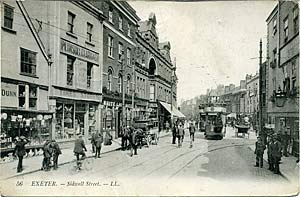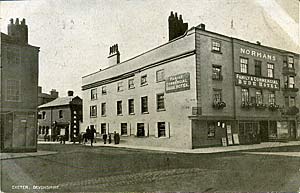
Exeter Stories
Exeter folk and friends in their own words - │ << Previous story │ Next story >> │
Mrs B Clifton - A St Sidwell's childhood
I was born in Union Terrace; that was a very nice terrace. You walked in and there were all big houses either side. I suppose there were 40 houses down there. And we had a front room, sitting room, scullery. The houses were all grouped around the court. Some had gardens in front. And everybody knew everybody else. My Granny, if anyone died, she was the one who called and saw to them and laid them out. And if you was in a bit of trouble, then you'd go to a person down the bottom and she would help you out of it. Now you see it's everybody for theirselves; everybody trying to out-do everybody else.
I'm talking about when I was a child. I used to go at half past eight in the morning to Hunt's the Bakers - that was next to St Sidwell's Church - and get two pennyworth of stale buns. You had a straw basket in those days and that used to be nearly filled up with rounds of sponges and all the rest of it. We only went there once a week; didn't see the need to go any more times 'cos there was plenty enough in there for us.
Then on Saturday evening my mother used to take me to the Hippodrome; I suppose we went to the first house and we went up the iron staircase, all up and up and up; 3d in the gods - I don't know what it was for me 'cos I was about eight. Well we used to come out of there and then we used to go down the High Street; the shops used to open Saturdays till 7 or 8 o'clock at night. And mother used to say to me, "Alright, now, go into Home and Colonial" - that was the one down the High Street and they had one up St Sidwell's - "and get three pennyworth of pieces of bacon." Well it was just a sea of people; there was no queuing up - just a mass see. But me, being a little girl used to waddle me way round and whisper to the man, "Three pennyworth of pieces of bacon, please," "Speak up my dear, speak up." "Three pennyworth of pieces of bacon please," and he used to go behind the counter into a room and bring out this great parcel: ham bones, ends of bacon, and al1 the rest of it
And from there we used be go down to Eastman's the butcher's and go in and get a joint. If there was a certain man that served me he only charged sixpence, but otherwise it was a shilling if it was another man. And we had our vitamins, you know, in they days. We used to go to Darches, the fruit shop; still there today down Fore Street. Three pennyworth of waste fruit and they gived you the carrier as well: bruised apples, dark bananas, bit of bruise on the pears. And my mother used to go to Hoskins' down Longbrook Street. You took a pillow slip and you got yesterday's bread, 'cos they never sold stale bread or nothing. She used to have half a pillowslip; it was about 2d or 3d, old loaves of bread. Then when my granny died we had to move into rooms in Paris Street up over a fish and chip shop. And on Sundays. because we only lived in rooms and we didn't have no place to cook we used to put the little sixpenny joint in with the spuds all round it and I used to go dovm to Hoskin's the bakers and fetch it all 12 o'clock.
And the friendship of the people that would help one another out: over the little alleyways down Cheeke street there were houses and they had little rooms where they sold bits of sugar. You'd go over for a pennyworth of tea, two pennyworth of sugar. And I can remember buying coal and putting it on my shoulder and bringing it home, so it couldn't have been that heavy. You could buy only what you could afford.
My mother used to take me Monday nights to the Palladium in Paris Street. We used to go to Taffy Fulford's for a pennyworth or ha'porth of waste and then we'd go to the Palladium. I don't suppose they paid much for me. But I knew all the film stars. I expect if the truth was known, I was born in the picture house you know.
As I said we used to go to the Hippodrome on Saturday nights which was be musical. You were sat on the long forms up in the gods. I'd be up doing my own act in the gods. At one time - I was only seven then - I used to do the errands for the little dwarves that used to come. I don't know if they were lodging near me or what but I remember they were on the act at the Hippodrome. They were about as tall as me and I were only seven. I remember one of the gentleman dwarves taking me home under his umbrella and giving me sixpence. That was a lot of money. I had to do a paper round for sixpence. Mind it wasn't a very big paper round; it was the shops up St Sidwell's. First of all you had to go over to Parr Street - that was the man Mr Stoneman who owned the paper round and you collected your papers. Mine wasn't a very big round - I don't expect I'd have been allowed to do a big round. But it was Stansfield's and Whites Garage across the road from the top of Paris Street and in the Maypole, about seven shops, and they gave me sixpence a week. And then I had to go back to Parr Street and Mrs Stoneman, that was, Mr Stoneman's mother, would have bread and butter all cut up in a bag: bread Ana butter for the children and bread and cheese for the men. And once she gave me the bread and cheese by a mistake - ooh it was lovely.
When I lived up over the fish and chip shop some nights I used to go down and chop the chips. I wasn't very old you know, wasn't allowed really. If I'd have gone to work when I was seven instead of going to school, I'd have made a fortune.
You know Belmont Park on bonfire night they used to build a wooden house there and of course they had the railings all around and you had to stay outside the railings with your mother. They used to build this wooden house and they used to set afire and the firemen used to put it out.
And I can remember the first electric tram that came down St Sidwell's, all alit up with electric light bulbs. And also at Cheeke Street, going up to get five pounds of potatoes and a rabbit for Christmas. For the poor you used to have a ticket. Then just before Christmas you got five pounds of potatoes, a rabbit and a swede or something like that. Usually I never had my ticket but I got me rabbit just the same. You see I learnt to use my charm, my dear. There were all the ladies weighing up the potatoes, rabbit and turnip and I said, "I haven't got a ticket and I haven't got a Daddy," and they goes among themselves, "Give her the rabbit."
Later I worked at the Bude, Ferris at the top of Paris Street; that went in the blitz. That was a beautiful restaurant and they had the bands on Wednesday afternoon and they'd come and dance on their half days. I worked in the Still Room, that's where you made the tea and coffee and the grill orders for the tea dances on Wednesday afternoon. There'd be hundreds of toast orders; I'd be off my head cos there'd be beans on toast, sardines on toast, scotch eggs on toast.
Well there were rats in all these big places. I was terrified of them and I know when I went to work at the Bude you'd go in one morning at nine o'clock and you'd leave at six and have your food and the next day you'd go in at ten and work till ten o'clock at night; you'd work in the Still Room serving up what was necessary. I was there one morning waiting for the girls to come in to pick up their dinner and I saw this thing move and I thought to meself, "Now what was that?" And it was a rat and he was that long. And I ran and he ran with me. They found me up on the roof. It was terrible. Madam sent someone up to get me down and said "Don't be so stupid, girl; It won't hurt you." That weren't no good to me. After that whenever they pulled out the silver knives and forks: the cutlery, I'd go, 'cos they'd have nests behind there.
Madam was very strict; demanded a lot of respect - just one look from her was enough. Mind she were a wonderful woman. She had her morning dress and her evening gown for dinner. The waitresses and the inside staff, we were just a big family. If anybody was in trouble she'd see them out of it. We all loved her like. People in they days, you had a job and you did it. You felt responsible; you were in it.
Then the war came and I went to Whipples and made the parachutes. I hated every minute of it
These memories are taken from the contributon by Mrs B Clifton to the People Talking project that was created by Jenny Lloyd in 1976. The full transcript, and other People Talking memories are available at the West Country Studies Library or the Devon and Exeter Institution.
 Sidwell Street in 1918 - the Standfield and White garage is left of the tram.
Sidwell Street in 1918 - the Standfield and White garage is left of the tram. The Bude Hotel where Mrs Clifton worked in the Still Room.
The Bude Hotel where Mrs Clifton worked in the Still Room.
│ Top of Page │